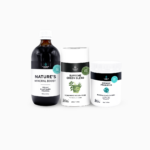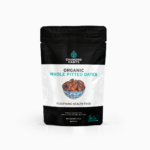Herbs and spices are often an overlooked way to improve and optimise your health further as they are incredibly nutrient dense. They are packed with many vitamins, minerals and antioxidants, some even more potent than many fruits and vegetables. This is why I am so excited to finally have both Organic Ceylon Cinnamon and Organic Turmeric powders available at Changing Habits.
A natural anti-inflammatory
Many of you have probably heard about the numerous health benefits associated with turmeric including its anti-inflammatory properties. There are currently over 7,000 studies researching the efficacy of turmeric and its active component curcumin. Turmeric has also been found to help activate genes that keep your brain clear of waste build-up that causes inflammation that weakens or destroys brain cells. The curcumin in turmeric has the ability to turn on a specific protein in the nucleus of the cell called Nrf2, which essentially opens the door for the production of a vast array of not only our body’s most important antioxidants, but also detoxification enzymes. This is not only important for dampening the inflammation in our body but also our brain. Population studies have also revealed a lower incidence of Alzheimer’s in the Indian population where turmeric is used widely in their cuisine.
As well as a natural source of curcumin, turmeric also has anti-inflammatory properties and contains antioxidants (to help neutralise free radicals in the body). It is antibacterial (to assist with liver problems and digestive issues) and contains manganese (required for digestion), iron (required for normal cellular function), copper (to help the body use iron) and potassium (an essential nutrient for fluid and electrolyte balance).
I truly believe that this highly-pigmented herb belongs as a staple in everyone’s pantry, not only for acute inflammation relief but also for long-term maintenance. However, it’s also important to note that while turmeric can play in a role in reducing inflammation, it’s not the panacea. We also need to eat whole foods and live a lifestyle that matches our evolutionary body with movement, sleep, fresh air and clean water and eliminating foods that cause inflammation as well as consuming functional foods such as herbs and spices to enhance the bodies innate intelligence to be healthy.
Be selective
However, not all turmeric is the same. When I started my own research and began looking at some of the turmeric supplements available, I found there was quite a large selection to choose from.
The source of the curcumin is often not as an extract of turmeric but rather created in a chemical laboratory so I’m often a little dubious of the results. The whole plant synchronistically works in a symbiotic relationship with each of the micro and macro nutrients working together so it’s important that the curcumin comes from a natural source.
Many of these products also had some dubious ingredients such as fillers, additives and excipients (a substance added to the supplement as a stability aid). One such ingredient I found in many turmeric supplements was Dibasic Calcium Phosphate (DCP). DCP has actually been found to inhibit the absorption of essential minerals within your system. Another ingredient often added is stearic acid also known as magnesium stearate, which is a potentially toxic metal additive from pill production. There are many others you may find as well, but the bottom line is make sure your turmeric comes from a certified organic producer who is committed to quality processes as you don’t need or want these chemical ingredients in your herbs or spices.
It is important to be very selective. If the dried herbs or spices you are purchasing aren’t cultivated, harvested, produced and packaged using certified organic processes, you could be deprived of its potent healthful active component which provides you with optimal benefits. Conventional spices and herbs are frequently irradiated (subject to radiation) which can also compromise the integrity of the botanicals. Personally I don’t like the idea of my food being zapped to prolong the shelf life.
15 health benefits of turmeric
Turmeric has many benefits including:
- Wards off Alzheimer’s disease by supporting memory function
- Boosts immunity
- Aids digestion
- Aids in cleansing and nourishing the skin
- Assists in blood sugar control
- Increases the antioxidant capacity of the body
- Decreases inflammation
- Helps ward off depression
- Aids liver detoxification
- Aids the circulatory system
- Protects against free radical damage of cells
- Supports eye health
- Helps to support your body against the effects of stress
- Promotes a healthy female reproductive system
- Supports skin elasticity and helps to balance the skin’s flora.
Eat with pepper and fat to aid curcumin absorption
Did you know that certain foods when eaten with turmeric can increase the bioavailability of curcumin (the anti-inflammatory and antioxidant compound in turmeric)?
Studies show that curcumin is more powerful when paired with black pepper. Black pepper contains a potent alkaloid called piperine which has been shown to increase the bio-availability of curcumin by up to 150%.
It should also be eaten with saturated fats such as ghee, butter, coconut oil or animal fats as fatty acids improve the absorption of curcumin, which is a fat soluble compound.
Serving size
I am often asked how to use turmeric and how much to eat on a daily basis. I eat turmeric most days but usually only use ½-1 tsp of turmeric powder in my cooking – whether I’m making a soup, stew, bliss balls or a dip.
For example; one day I might have a teaspoon of turmeric in golden milk, the next day I’ll have a teaspoon in my morning broth and the next day I will make a slow cooked curry using turmeric and the following day I will sprinkle some over my eggs. I may also make date squishes with turmeric and cinnamon.
Turmeric powder is very safe to consume but side effects can occur when very high quantities are consumed over a long duration of time continuously – and can be from supplements which have been manipulated by technology with the turmeric no longer in its natural form. Typical side effects vary from person to person, but some people may experience some digestive issues, ulcers, stomach upset or diarrhoea.
Get turmeric into your diet!
Because turmeric is not a sweet spice, it can be used in both sweet and savoury dishes. Here are a few simple suggestions on how to incorporate turmeric into your diet!
- Add to smoothies
- Juices
- Tea
- Soups and stews
- Bone Broth
- Dips (such as hummus or yoghurt dips)
- Rice or cauliflower rice (mixed through)
- Curries
- Bliss balls
- Pancakes (sweet or savoury)
- Slices (Cyndi’s tevol bars)
- Sprinkled over fried eggs.
Here are a few recipes of to get you started so you can begin to incorporate this wonderful spice into your daily diet. Tumeric Tevol Bars, Golden Milk, Brothy Pumpkin Soup, Turmeric Paste
Happy Changing Habits, Cyndi







Thankyou so much for such a well informative link a friend sent it to me. I have rhumitioid arthritis and fibromyalgia and I think tumeric is the only thing I haven’t tried, sounds like a wonderful spice and I can’t wait to try it. I’m have to travel to obtain fresh things like this and off today to get some, quite excited. ? ?
Thankyou Glenda x
Hi, just listened to your recording on the Anxiety Summit and I’d love some of your recipes but the links on this page don’t work https://changinghabits.com.au/turmeric-the-spice-of-life/.
Cheers!
Hi Carol, thanks for pointing this out, we’ve fixed it now. You can also search for more recipes here: https://changinghabits.com.au/our-recipes/
Is Tumeric safe to take when you have high blood pressure? Thanks Colleen
Hi Colleen, yes it is, as it is just a food 🙂